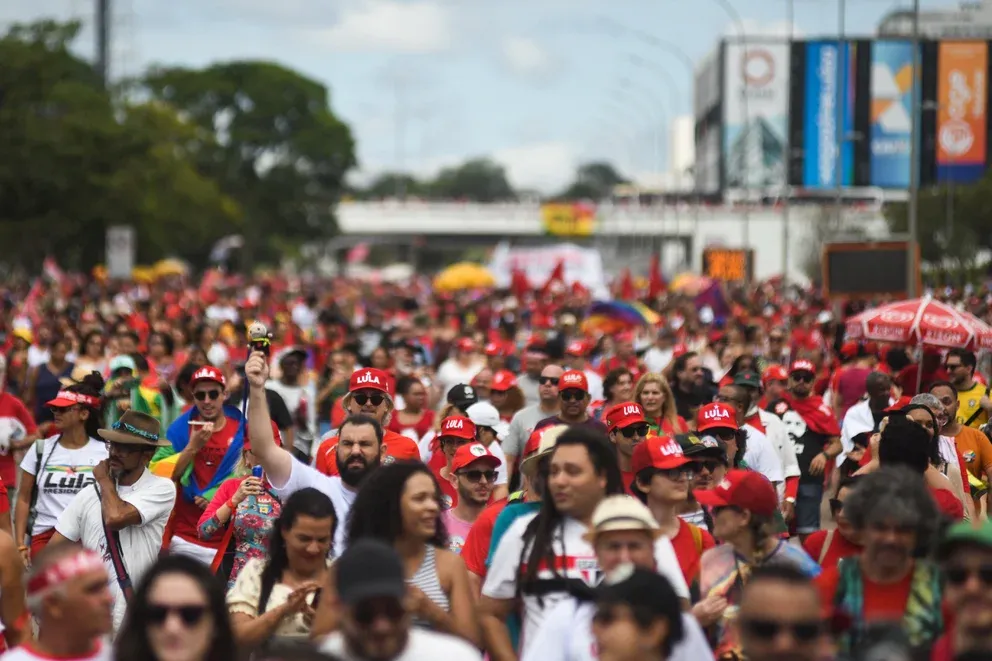Luiz Inacio Lula da Silva assumed the presidency of Brazil for the third time in the midst of a climate of polarization in which his staunchest detractors assure that his return to power means the “return of corruption.” His electoral victory was, in many ways, a political resurrection after the leftist leader spent a year and a half in prison on corruption convictions that were later overturned. With that in mind, getting out of the shadow of that problem is a task that can’t wait.
Closely linked to this is the political polarization in Brazilfueled by the statements of the far-right ex-president Jair Bolsonarowho for months extolled the electoral fraud discourse and who left Brazil before the assumption of Lula so as not to have to give him the presidential sash.
SIGHT: The lapidary phrases of Lula da Silva against Bolsonaro in his inauguration speech as president of Brazil
In this climate, it is unlikely that the leftist president will regain the popularity he once enjoyed, or that his approval rating will even exceed 50%, Maurício Santoro, a professor of political science at the University of Washington, told the Associated Press. State University of Rio de Janeiro.
One of the main reasons is the link that a large part of the country makes between Lula and the workers party (PT) and the corruption. Both the president and members of his group were imprisoned until their convictions were annulled. In the case of Lulathe Federal Supreme Court found that the judge presiding over the case had sided with the prosecution to ensure that he was found guilty.
Daniela Neves, PhD in Political Science and specialist in elections at Brazil, affirms that the Lula government begins with signs that it wants to form a broad government, although without major negotiations. “It’s a sign of control and that if you stick with it, you can reduce the risk of corruption. Corruption was an important issue during the campaign and part of society will continue to be vigilant in this regard, which also contributes to controlling the fight against this problem.”, he tells El Comercio.
The challenge of getting away from corruption
Lula da Silva he had been convicted of the crimes of passive corruption and money laundering and it was believed that his political life had come to an end. However, in 2021 the Federal Supreme Court (STF) revoked these sentences, considering that the rights of the then former president had not been respected during the process carried out by the then judge Sergio Moro.
Despite the annulment of the conviction, critics of the leftist leader affirm that the trials were annulled for technical reasons and not because his innocence was proven.
For Neves, yes Lula If you want to get away from the burden of corruption, you must send a strong message to your ministers, party leaders and Congress that public policies and the budget will be negotiated in a transparent manner.
“The end of the Secret Budget defined by the Supreme Court and the rearrangement of resources between the government and the deputies should minimize this form of institutionalized corruption that was created during the government of Bolsonaro. On the possibility of corrupt actions in the next government, in addition to the control and transparency systems, a firm leadership of the government is necessary Lula”, he points out.

Challenges on other fronts
As he took over the country on Sunday, Lula He stated that his priorities are to fight poverty and improve education and health care. He also pledged to stop illegal deforestation in the Amazon and signed a decree to tighten gun control.
While in his previous administrations the former union leader lifted millions of Brazilians out of poverty during a commodity boom that boosted the economy, this time he faces the daunting challenge of turning around a stagnant economy.
For this reason, Neves affirms that the main challenges of the Lula government will be the resumption of public policies in the main areas of public administration -Education, Health, Infrastructure, Economy-, the same ones that -he considers- have weakened in the government of Bolsonaro.
“Regarding the recovery of the economy, both the crisis generated by the pandemic and the decisions of the Government in recent years have contributed to slowing down the Brazilian economy, which needs to be reactivated with the return of credit policy, public investment and the incentives for private investment. These will be years of recovery that, if planned well, will probably bear fruit after the second or third year of government”, points out the expert.
For this reason, it considers that this will still be a year of much negotiation between the political parties and of putting to the test the model of a broad front of government that Lula, the same one that unites many different parties in a single project. “Getting this broad front to work, without major conflicts, will be the first step for this government.”, he concludes.
Source: Elcomercio
I am Jack Morton and I work in 24 News Recorder. I mostly cover world news and I have also authored 24 news recorder. I find this work highly interesting and it allows me to keep up with current events happening around the world.

:quality(75)/cloudfront-us-east-1.images.arcpublishing.com/elcomercio/RINBD7D4ZVEUHPN2DCBODTYRZE.JPG)

:quality(75)/cloudfront-us-east-1.images.arcpublishing.com/elcomercio/ODIWOCDO45EZNAFALA5VLBHPSQ.jpg)
:quality(75)/cloudfront-us-east-1.images.arcpublishing.com/elcomercio/X2Z76DLE65BTJHEJLGKY5SZMIA.jpg)
:quality(75)/cloudfront-us-east-1.images.arcpublishing.com/elcomercio/A7Z2RRELJ5HDVOKDSRKRAVR22E.jpg)
:quality(75)/cloudfront-us-east-1.images.arcpublishing.com/elcomercio/2QJGRB6ZLJBUFN72H3T6W2ZBOA.jpg)
